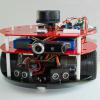Hi,
Thanks for your help, Cheers! But I’m confused!
I know about setting of pins and their values, but my question about programming these and their assignments!
For the first time, When Pins class is written and is run successfully (without error)?
You mean that the setting is done at the time of porting board? This mean that there is an error but this program is running correctly in the first (at the time of porting)? If I want to write a Pins class with correct values, I don’t have any problems and it is running successfully? So how do you solve compiler error?
Because I really have an error for this line! 
public const Cpu.Pin ONBOARD_LED = 55;
Error :
Cannot implicitly convert type 'int' to 'Microsoft.SPOT.Hardware.Cpu.Pin'. An explicit conversion exists (are you missing a cast?)
afsane


















